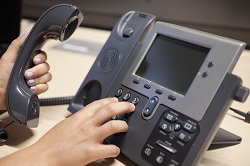
For Immediate Release: February 11, 2015
February Hot Topics:
- Harassing Calls from Debt Collectors?
- Tips for Protecting Yourself from Tax Identity Theft
Harassing Calls from Debt Collectors?

Receive a call that feels forceful and harassing from a debt collector? Here’s what you should know about your rights under the Fair Debt Collection Practices Act:
- The law does not apply to debt incurred from owning a business
- It does not erase any owed debt.
- You may be contacted by a debt collector in person, by mail, phone, or fax but you should not be contacted at inconvenient times or places. Collectors cannot call you before 8 am or after 9 pm unless you have agreed to allow them to contact you at those times.
- If a debt collector knows your employer disapproves of contacting you at work, they may not contact you during your work hours. It is your responsibility to notify collectors of your employer’s disapproval verbally or in writing.
- If you are working with an attorney, a debt collector may contact your attorney instead of you. If you are not working with an attorney, a debt collector may contact relatives or friends to find out basic information such as where you live, what your phone number is, and where you work.
- If you do not want to be contacted by a debt collection agency anymore, you must send them written notification. Learn more about what to include in the letter by following this link.
- If you receive notice that you are being sued, respond to the notice; do not ignore it.
- The first time you are contacted by a debt collector you must receive a written validation notice which includes: the amount of money owed, the name of the creditor who the money goes to, and steps to take if you don’t think you owe debt. This letter should be sent within five days of your first contact.
If you receive a call where a debt collector is harassing you or making false statements or threats that you will be arrested and/or property or wages will be taken away, know that this is against the Fair Debt Collection Practices Act. A call may not be legitimate if the caller won’t give you their contact information or information about where they work. As a best practice, keep track of the calls you receive from a debt collection agency and any paperwork sent to you, and make copies of the papers you send to collection agencies. To protect yourself and your privacy, always research companies that contact you and check their Business Review on our website at bbb.org/indy. You can also find an Accredited Collection Agency here.
Find more information about the Fair Debt Collection Practices Act and how to report violators on the FTC’s website.
Tips for Protecting Yourself from Tax Identity Theft

The sooner you file your taxes the better! This can help prevent someone from stealing your tax identity. According to the FTC, in 2014, tax-related identity theft was the most common form of identity theft reported.
Consumers don’t usually find out about a stolen identity until they file a tax return and find that they owe additional taxes, or through IRS records of employment for a company they don’t know about. Tax identity thieves try to get a refund or secure a job by using someone else’s name and information. Potential signs of tax identity theft is if your wages are displayed incorrectly or your taxes were somehow filed before you did the filing. If this happens to you, contact the IRS as soon as possible at the IRS Identity Protection Specialized Unity at 1-800-908-4490.
Here are some tips to help lessen the chance of tax identity theft:
- Consider filing your tax return electronically, but if you do desire to mail your tax return, do it from the post office.
- If you don’t need copies of your tax return, drafts, or calculations, shred them.
- If the IRS contacts you through mail, be sure to respond to them as soon as you can. If the IRS desires to get in touch with you, they will do it first through mail and won’t initially contact you by email, text or social media.
- Before you give your personal information to a tax preparer, be sure to look for their Business Review on our website at bbb.org/indy/. You can also find BBB Accredited Tax Preparers here.
- As a reminder, don’t forget to check your credit report to catch signs of identity theft. Access your free annual credit reports at AnnualCreditReport.com. Consumers can access each free credit report every 12 months or may choose to access one of the reports every four months, which allows you to review your credit throughout the year.
If you have a question about a company or want to find an Accredited Business you can trust, visit BBB’s website at: bbb.org/indy/.
To schedule an interview or for more information, please contact Tim Maniscalo at: tmaniscalo@indybbb.org or 317.488.2202.